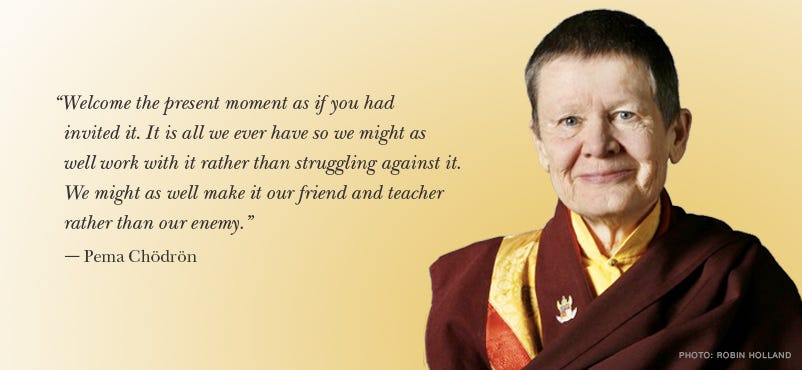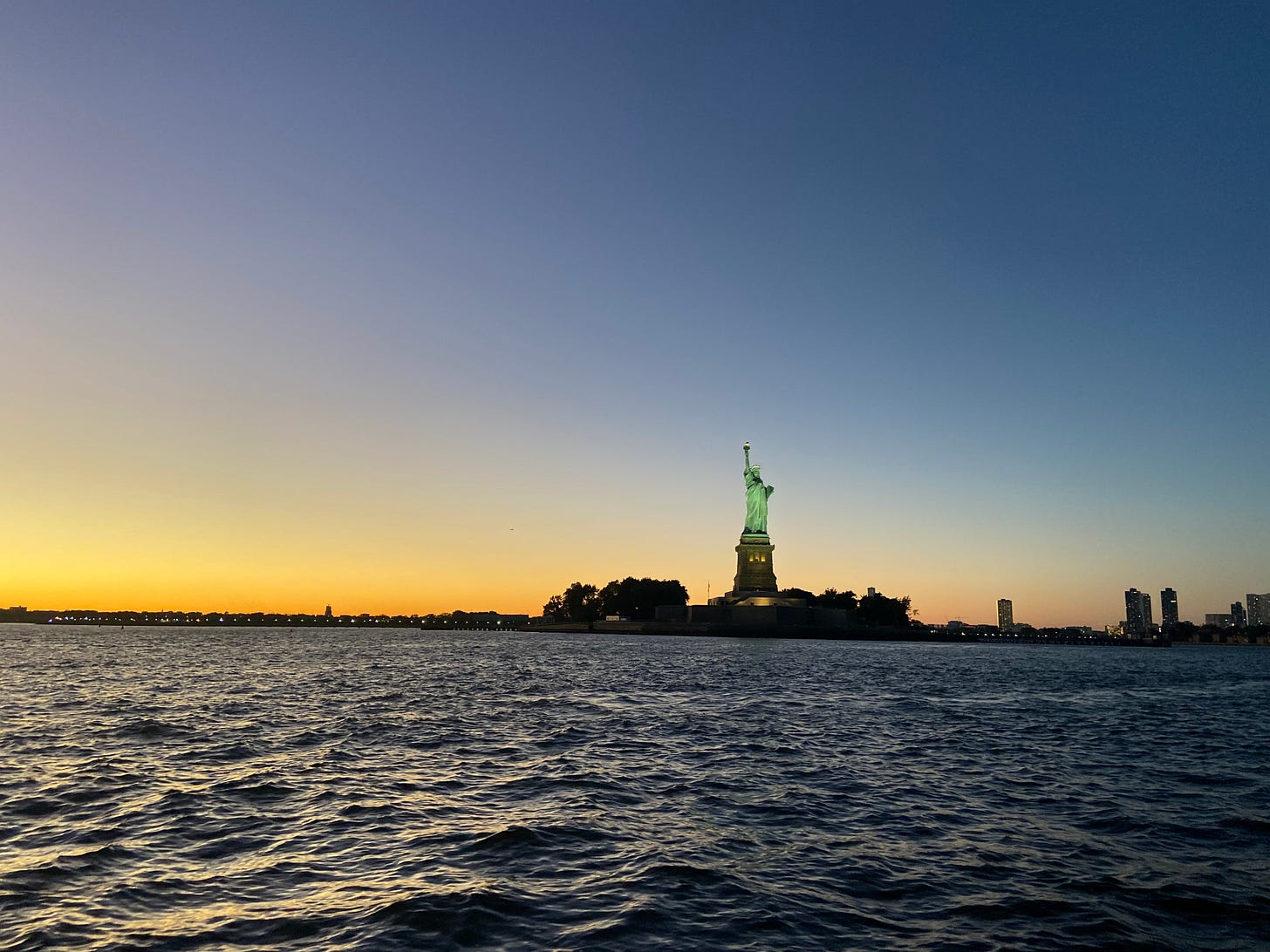Starting anew, once again, amid endless uncertainty
All of life is an uncertain existence, no matter how many systems or predictions we make; everything is a transition
Hi friends,
I was emotionally exhausted for much of the past week or two, not so much because of our move to Brooklyn, but because of another job transition. This past spring, I began work as a writer at a small financial research firm in New York. After four months there, I received an offer to write and edit with brilliant people at a “FinTech” in hyper-growth mode. The other benefit: flexible work. Rather than sit in a cubicle five days from 8-6, I can work mostly wherever — a luxury I missed since I’m a creative person who thrives on new, inspiring environments to do my best work (and feel good). (More and more Americans can relate.)
Still, saying goodbye to a company I enjoyed working for was exhausting. I felt nauseous, guilty, and worried. I journaled and lifted weights through the anxiety, but that didn’t dull all of the stress. I felt as though I was betraying the people I’d just begun working with, back in April. I enjoyed them, the work, and the growth prospects. But the setup of being at a windowless office for 9-10 hours a day became a real con, something I did not enjoy. Plus, the next organization made an offer that was too good to pass up. We can’t take any of this stuff (or money) with us, and I’d rather use some of that commuting and office time to invest in relationships and experiences, which create nostalgia. Experiences and memories also compound over time. So, I said what the heck, and decided to dive in on a new adventure.
Further, less time stationed at the cubicle means more time for:
Producing quality, creative work for the new company
Meeting colleagues, clients, and friends/family for meals and good conversation
Traveling, exploring, expanding the imagination
Volunteering, handing out meals, giving back
The kind messages that colleagues left as I departed prompted me to second-guess the decision, reminding me that the quality of our relationships usually dictates the quality of our life. More than the actual work, I’ll remember my now former colleagues with whom I interacted daily. I’ll remember the kindness of my supervisor, Adam, who frequently reminded me of how much he valued my efforts — a good example of how praise and positive reinforcement leave a lasting impression. I’ll also remember the kindness of one colleague and friend, Chris, in particular, as he not only brought me onboard the firm by responding to my cold email but he also would buy the janitor, as well as the security guards, orange juice in the morning. That stayed with me and drove me to do the same.
These sorts of job transitions are a centerpiece of life — moves, new jobs, new relationships, and so on. At times, I used to run from transitions when I could, seeking the comfort of familiarity. Now, I try to recognize them as key components of a life well-lived. Moving and changing and transitioning are inevitable parts of growth. As Buddhist nun, author, and teacher, Pema Chödrön, said, “Things are always in transition, if we could only realize it.”
We may transition into marriage, or we may move through a divorce, or we may transition into a new friendship or hobby. In the past couple of years, I’ve changed jobs, lost loved ones, moved homes, begun new friendships, and ended others. Even a new child entering a family creates a transition for everyone. There is a transition in getting sick and getting well, too. It can all be unpleasant at times, but to experience unsettling feelings is to be human.
Psychologist Susan David explores this in her TED Talk, The Gift and Power of Emotional Courage. Judging feelings as good or bad, she says, is rigid. It does not allow us to develop our emotional agility, and emotional agility allows us to maneuver the twists and turns of a transition. To those who say, “I just want this feeling to go away,” she replies, “I understand, but you have dead people’s goals. Only dead people are not inconvenienced by their feelings.” To have feelings is to experience the core of being a human.
As Chödrön, wrote in When Things Fall Apart, “Life is a good teacher and a good friend. Nothing ever sums itself up in the way that we like to dream about. The off-center, in-between state is an ideal situation, a situation in which we don’t get caught and we can open our hearts and minds beyond limit. It’s a very tender, nonaggressive, open-ended state of affairs.”
In the past year-plus, I also had another type of transition: falling outs with two people with whom I was pretty close. One relationship has been restored. Both "breakups” were exhausting and stressful. They were people I respected and enjoyed being around. The friendships were mutually beneficial. When we hung out, the time seemed to pass quickly. Moving in and out of relationships with significant others, colleagues, family members, or friends can all be taxing experiences. My lesson is that all of life is an uncertain existence, no matter how many systems or predictions we make, or how clearly we try to map out a plan. I’ve learned this through recent transitions; the pandemic; the unpredictable stock market; and so on.
***
Over the past few years, Ally and I have moved numerous times for internships, college apartments, and now real-life living arrangements in big cities. After Labor Day, I start my third job since college, another risk, another transition. But it’s a risk I’m taking, in part, because now is the time for risk-taking and pushing forward to the edge, so to speak. Time passes too quickly to sit back and wonder, "What if I had taken that job or not moved there?” The framework of, “What’s the most interesting, healthy path?” has guided me on most big decisions such as this one.
This is to say that I’m just winging it, like many of you. We are tinkering and figuring things out as we go. There’s still self-doubt that lingers. Am I making the right decision? Am I being a supportive boyfriend/friend/son/colleague? Will I be able to hit my savings goal, travel, and socialize, while producing great work?
I find comfort in knowing our doubts are not just among us. I just came across a passage someplace that said tennis star Serena Williams still gets “insanely nervous” before matches. As of a few years ago, artist Leon Bridges said that, while on stage, he still got a sense of, “These people are here for me?” Writer John Steinbeck doubted his writing, George Washington worried that he didn’t meet people’s expectations, and Leonardo Da Vinci experienced self-doubt, procrastination, and self-esteem. He was also quite hard on himself, questioning his self-worth and whether he’d done anything truly worthwhile.
These reminders shall drive us all to know we’re not alone in our down days, self-doubt, or self-critique. Maybe the magic is to keep going in spite of all these things. Maybe the magic is also to keep moving forward, without perfect plans, or full confidence, or a vision — to just do the thing we know we need to do, and be the most loving person we can be on this particular day.
Author Rich Cohen was on The Daily Stoic podcast, and he said something that resonated with me. One time, he was running to cross a street before the light turned, and a friend stopped him. “Why do you want to live like that?” It begs the question — why do we want to live like that? Why do we want to rush to hit lights? Why do we not let someone in front of us? Let’s live deliberately, without hurry.
U2’s “Beautiful Day”
This might be my favorite song. The lyrics of Beautiful Day by the Irish rock band U2 is about a man who has lost everything in his life but is still joyful. Blender, the old music magazine, interpreted the song and the line "it's a beautiful day" as "a vision of abandoning material things and finding grace in the world itself.”
Wrote someone in this video’s comments: “When I was 21, I was diagnosed with cancer. When I left the doctor's office after receiving the news, this song was the first thing that started playing on the car stereo. I decided I could take it as either a cruel joke or a rallying cry. That was nine years ago yesterday. This song still brings tears to my eyes.”
Cutting distractions is a fast way to get much more productive, less stressed, and more ingrained in deep work. It also helps slow down time, at least a tad, and it ensures more high-quality activities characterize our days. Recently, I discarded my Apple Watch, which was becoming too distracting. I try to lock my phone away during a creative time, get rid of tabs in browsers (distractions), and reduce the number of bookmarked pages. Less is more. Protecting life energy is a worthwhile pursuit.
Writer Zadie Smith explored this topic in her 2013 essay, ‘Man versus Corpse’ —
“You need to build an ability to just be yourself and not be doing something. That’s what the phones are taking away, the ability to just sit there…that’s being a person…Because underneath everything in your life there is that thing, that empty — forever empty.”
That’s the comedian C.K., practicing his comedy-cum-art-cum-philosophy, reminding us that we’ll all one day become corpses. His aim, in that skit, was to rid us of our smartphones, or at least get us to use the damn things a little less (‘You never feel completely sad or completely happy, you just feel kind of satisfied with your products, and then you die,’) and it went viral, and many people smiled sadly at it and thought how correct it was and how everybody (except them) should really maybe switch off their smartphones, and spend more time with live people offline because everybody (except them) was really going to die one day, and be dead for ever, and shouldn’t a person live — truly live, a real life — while they’re alive?
I also think of the Nietzsche line about how I will die, those I love will die — we all will die at some point….Let that drive us to take in every moment we can. “Caretake this moment” as the Stoics might say.
Photos of week: We sailed near the Statue of Liberty on Sept. 1. The French sculptor Frederic-Auguste Bartholdi created the statue itself out of sheets of hammered copper, while Alexandre-Gustave Eiffel, the man behind the famed Eiffel Tower, designed the statue’s steel framework.
Above Maryland, in flight — in another transition:
Two Parting thoughts: “Time is really the only capital that any human being has, and the only thing they can’t afford to lose.” —Thomas Edison
“Success is not a measure of your salary, title, and degrees but the impact you have on others and the collective happiness of the people you touch.” — The Daily Coach
Parting question: Where in life can you slow down and be more deliberate?
Be joyful and celebrate your gifts,
Matthew



